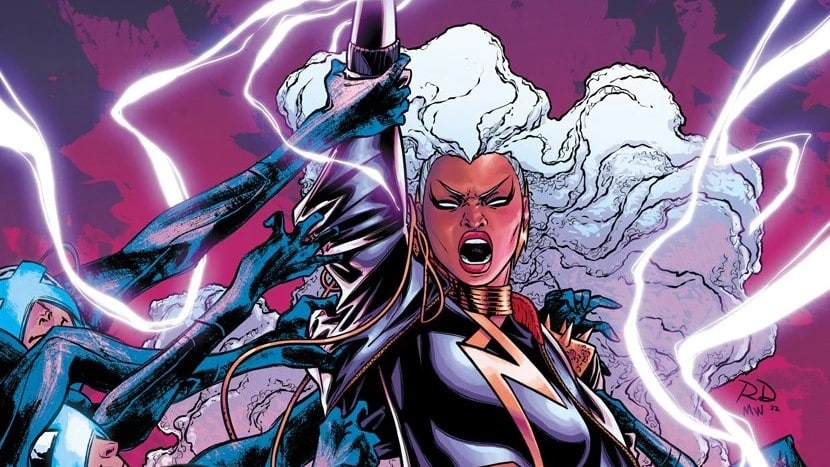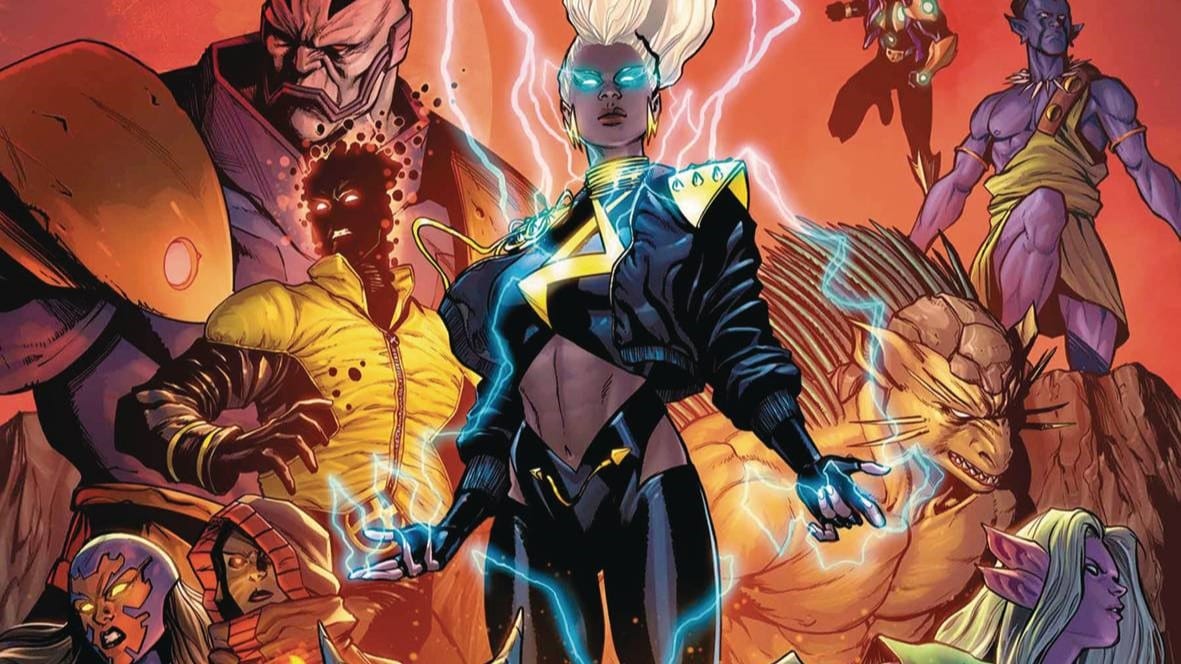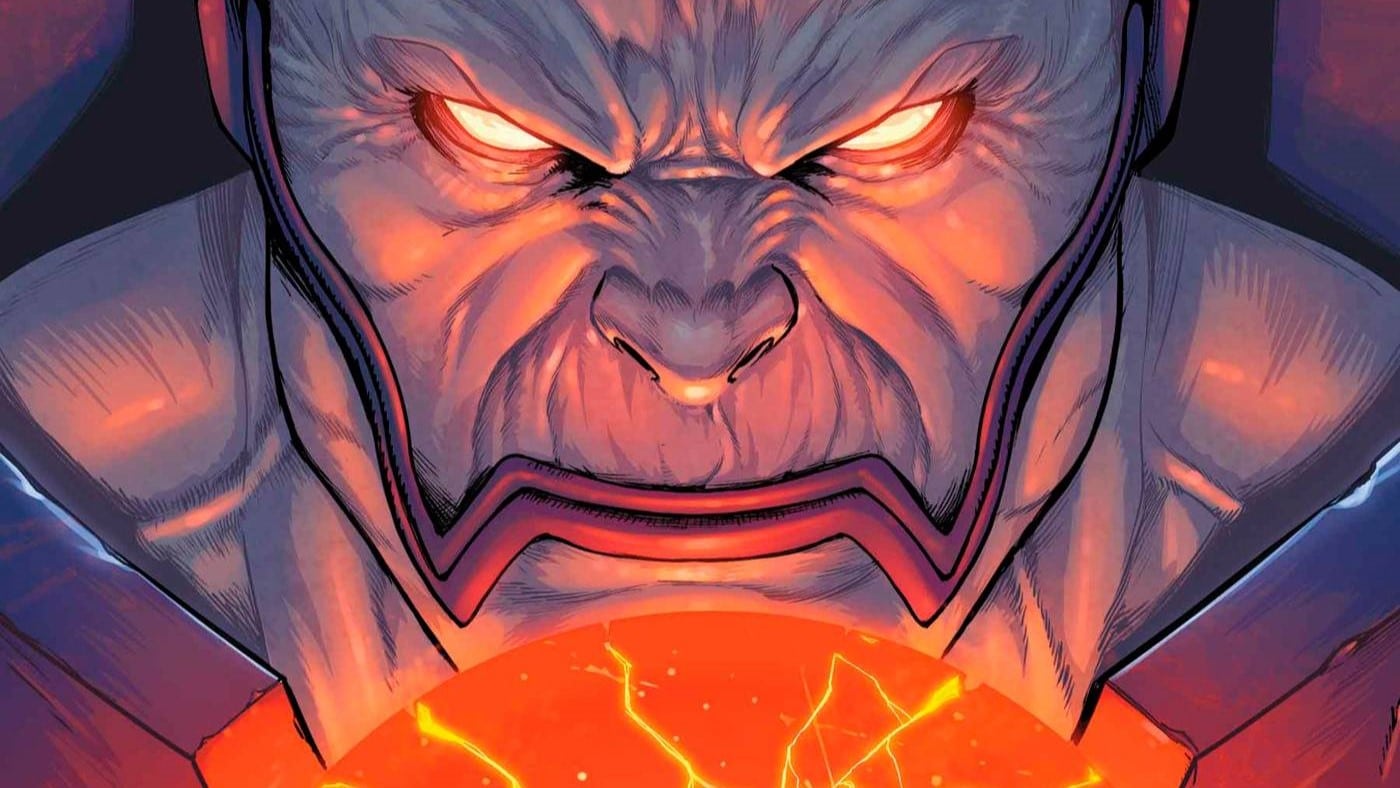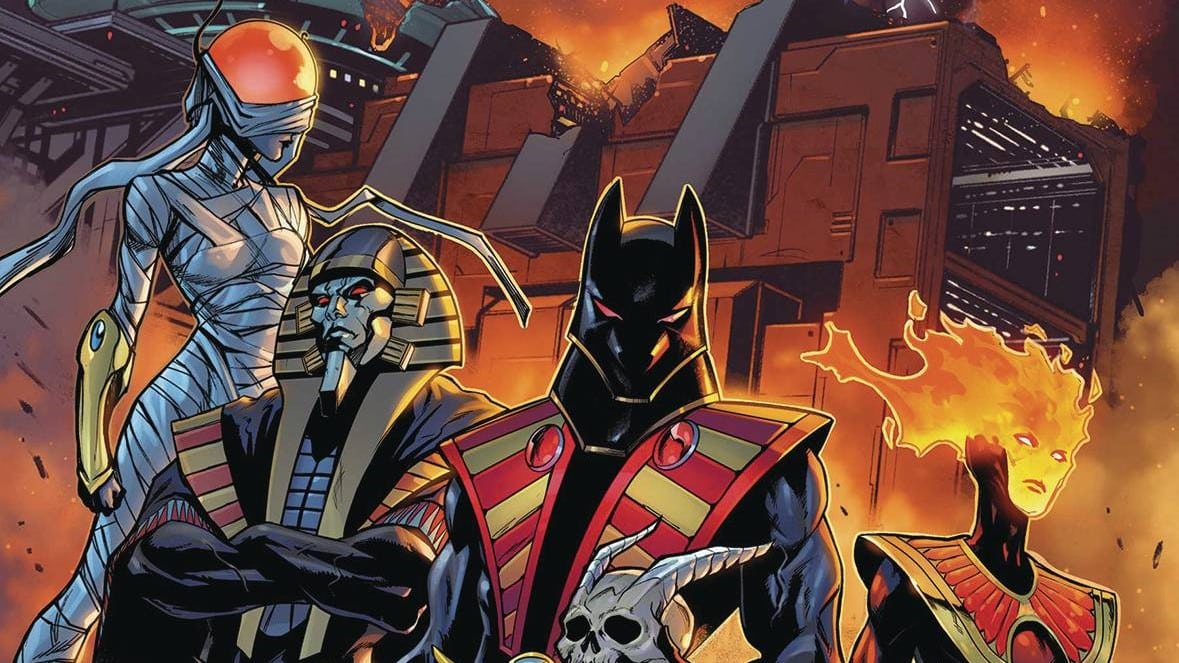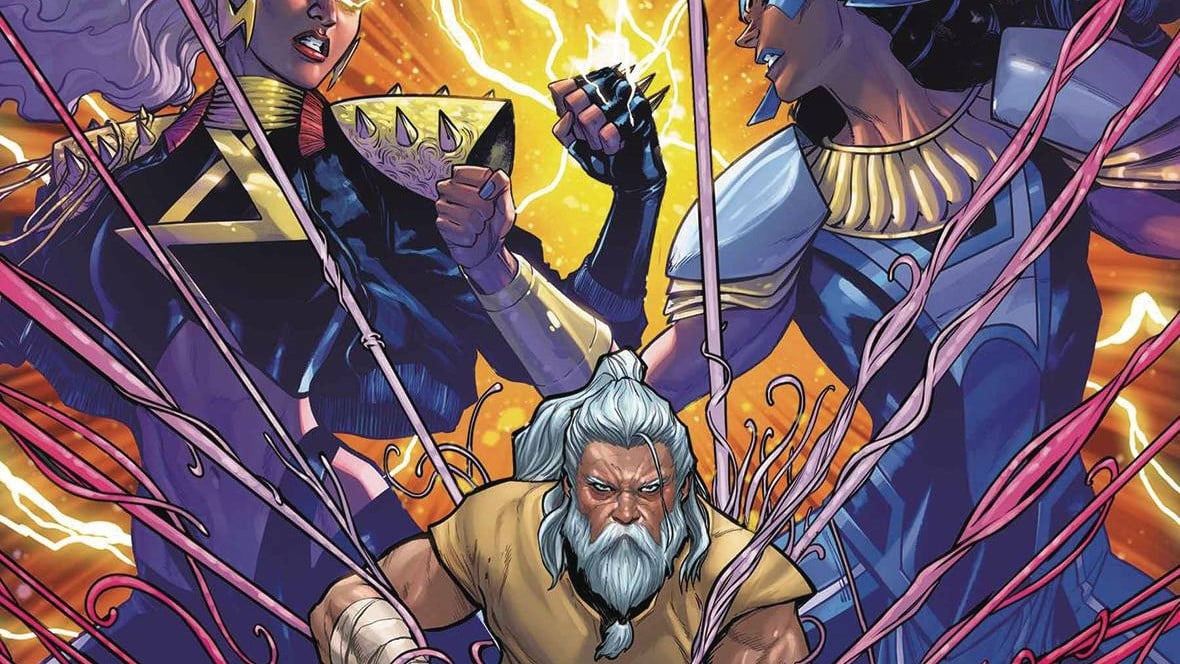The feelings of exhaustion, oscillating to exasperation and back again; the anger, masking sadness; the wounds that I keep seeing over and over and over again.
I was tempted to say I was tired, but that is a lie.
I am not tired.
I am traumatized.
And I am not alone.
Comics are many things, two of those things in continual, contradictory tension: one one hand, the desire to entertain – to make you forget, for a moment, all of this. On the other, the desire to speak for you and your lived experiences; to give your emotions words and an illustrated form, in the hopes that speaking it aloud might help you – us – heal.
The Arakki are walking testaments to trauma: a society predicated upon the strongest dominating the weaker, on your place in society determined by your ability to service, upon the pride of furloughing help and voicing your pain as a means of affirming your place.
A society socialized around trauma responses.
X-Men Red #11 is a return to form for Al Ewing, as he can finally, again, tell his story without acquiescing to the plot needs of an overriding crossover. He takes time here to examine the psyches of our traumatized characters, showing how they deal – or don’t deal – with their demons. And while I can understand why some people might not appreciate it – those who are just jumping in, those hoping for more action, more fight, more escapist fantasy – I argue that this issue, weaving seamlessly from character to character, provides more depth and enjoyment than any skint or explosion has ever mustered.
The Secret Garden
Craig Robinson is the manifestation of the best of us. Though human, he was welcomed into Arakki culture because he valued the life of others over his own. He respected, represented, the values of their culture.
He’s also a Black American man. He – we – understand pain and the pained, loss and losing. But unlike so many of us, he’s grown from it, becoming a conduit of healing for the kids he protected.
I wonder if he feels more at home, more able to heal among these prideful warriors than in America (he wouldn’t be the first!).
Also, he’s dating the goddess. If that’s not healing (and winning!), what is?
And of the goddess? Storm’s voice narrates this issue. In this narration we, in a voice more honest, more personal than what we’ve received from many other writers, we understand how she’s processed her pain from the non-stop drama she’s endured. She’s lost her boyfriend; she’s learned of her future-past via Rasputin IV; she’s still mourning the loss of her (maybe more than) friend Max, née Magneto.
And yet she’s still standing. Soaring, actually, finally ready to settle to have time to herself.
We rarely get to see her not be a goddess, not be a perfect, adorned, worshiped figure. Here, she’s appreciated, courted, expected to take in a conversation as much as give; awkwardly flirting for her own enjoyment.
Is she worshiped here? No, she’s simply adored as a potential partner, not as a projection of someone else’s fears and desires.
Here, she’s allowed to do for herself.
And she enjoys it, until she’s again called away to save someone from themselves.
A critique of Storm might be that she’s too perfect: a magical negro, or a better illustrated mammy, cleaning up the mess of others while only offering a quip in return. That’s she’s not given the space to be imperfect, or to be sad, or pensive, or passionate – only stoic. That stoicism is the prison so many well meaning white writers encapsulate their Black characters in.
But here, she feels. She flirts. She gets angry, emotional, imperfect…
She feels whole.
And as she is whole, the book, the story, feels more whole as well.
Betcha Wouldn’t Hurt Me
Charles, however, is not whole. A little misdirection before the issue implied that he’d try to resurrect Magneto against his wish; yet he just (“just”) wants to know the parts of his best friend that he kept from him. He wants intimacy. He’s lonely. He is angry and scared by his own admission. Maybe even a little jealous of Storm’s increasingly, uh, intimate, encounters with Mags, right up until his death.
Losing a friend to death his hard. Losing one while you’re both still alive? Even harder.
Charles doesn’t know how to reconcile having this massive psychic power, power to take from someone’s mind at will, to know whatever he wants whenever he wants, with the realities of people hiding from him; of him restraining himself and not knowing if that’s for the best or worse; Of second guessing himself and all of his choices, including Krakoa.
Again, this is masterful introspection, I’d argue a step above the (quite great) work that was Immortal X-Men #10. He is a traumatized man who is just coming to recognize how hurt and broken he is.
But rather than ask for help, rather than speak the pain aloud, he asks – commands – the goddess to perform for him, To give him that which he desires, (Magneto’s last thoughts and words) to comfort him. And in her reticence to adhere – in her desire to affirm her own self above someone else, to not be the servant goddess – there comes conflict, illustrated in one of my favorite panels of the past few years.
It’s hard to succinctly describe how impactful the final few pages of House of X #4 were. The allusions to the pain of death, how “they’ve murdered so many of us, the world had grown used to it. This is just…how things are for those people.” The allusions and metaphors were clear, and the following pages of black and white imagery, showcasing the anger and pain of Charles, are retroactive validation for his audacious plan to resurrect and defend his people by any and all means.
Even morally circumspect ones.
Here, that imagery is flipped on its head, as Charles forcefully tries to pry the memories from Storm’s mind.
To say the illustration of their psychic battle is thematically masterful does not give these pages enough praise. Using old comic panels to represent his attempt to infiltrate her mind – in the form of him *directing* her to adhere – and her pushback, reminding him she is a goddess and, implicitly, independent (as he recognizes his mistake) might be the most affecting use of the art form I’ve seen since House of X #4
Note also that the use of older panels offers subtle pushback against an interpretation of Xavier’s actions being latently influenced by Sinister. No. He has always been this self-righteous and self-important. He’s always denigrated the will and autonomy of others to serve what *he views* as the grander purpose of mutantdom. The intent has always been there, which is what scares and sobers Xavier so.
And about scares and sobering: maybe Storm’s psychic defenses, imbued by her latent magic powers and wholehearted embrace of her godhood, drove Xavier back.
Then again, remember in Sins of Sinister, where Xavier tore down that Beast’s psychic walls, noting that he taught him how to build those defenses, so of course he would know how to circumvent them.
If you squint your eyes, you can see where Xavier says “dear god, what have I done?” Maybe part of the psychic defenses he taught to Storm were to trigger his guilt.
Maybe, midway through his assault, he recognized he was wrong.
Maybe his loss in this battle of minds and hearts is just as much about how strong her will is as it is about how weak his will was.
Maybe this fight was simply a reminder to him about how far he’s fallen.
In any case she rejects him from her mind and, more poignantly, from her heart and her land. In his desire to get closer, he has pushed her away and become even more isolated.
Maybe this wasn’t wise on her part. She could recognize his pain and extend him grace. Her ostracization may further push Charles to the edge, where who knows what he’ll be prone to do.
But then again, she was intimately assaulted. She told him now and he, in rage and power lust, ignored her autonomy. Her personhood.
Her humanity.
Was she unkind? Yes and, simultaneously, one could argue she was too kind here; that violence in response to violence was not only warranted, but deserved.
In retrospect, her restraint – hurting him with words, not force, in the same way the white queen did to her in – was just as powerful and necessary as any lightning bolt.
And thus, we see Xavier yet again getting exactly what he wanted, but at a high pyrrhic cost.
The Fall of X may well be about this mutant society which will fall. It’s also more intimately about the fall of the man named X. And that, is a much, much more interesting, nuanced, and deserving fall than that of an entire oppressed people.
But we will see. We will see.
Back on the Block
Exposition – telling instead of showing is sin with comics, a format explicitly created to show as well as tell. And yet, the amount of information given here is so dense and so necessary to establish norms for the next arc of the story, that I’m not sure if there was a better means of establishing the new normal.
And, certainly, if you’re going to go through expository explanations, what better way to do so than by having three guys naked in a hot tub? In short order we learn:
- The universe is a mess, and Arakko is maybe the only standing diplomatic zone in the galaxy, making it a target for disruption.
- Kobak is getting ready to take a seat in the Arakki council, which has some seats still up for grabs
- There’s a seat of dreams among the new seats – one that sounds like it’s in direct opposition to the more belligerent and fatalistic seat names of the past
- An “omega Wolverine” named Lycaon, which sounds suspiciously close to Lycan, is at the Seat of Stalemate. (Note the use of gender neutral terms in referring to them.)
- Richard Ryder doesn’t think he’s a cop. (Richard Ryder is absolutely a cop.)
Alerted to an incursion at the otherworld gates, our dynamic duo put on some (leasure) clothes to take note of who or what is causing the disturbance.
The White Sword, the blue mutant introduced in the X of Swords mini series has died, and directed the last of his soldiers to warn the Arakki of the coming threat:
Genesis is coming. Notably, not “Genesis and her husband :A: (née Apocalypse),”
Just Genesis.
And the last of those soldiers? None other than Jon Ironfire.
In keeping with X-Men Red tradition, the last page is a wonderfully braggadocious full page shot, showing Ironfire holding the reality-cutting sword of the, uh, White Sword, Purity.
X-Men Red #11 masterfully establishes the new norm, giving voice and autonomy to the fears and frustrations that move and motivate our main characters. Sins of Sinister was exhausting, with Storm and the Brotherhood feeling like more of an extended background story than anything else.
Here, finally, characters are given room to talk. To emote. As Storm says, it’s the Fisher’s way: “you can’t heal if you don’t say the pain aloud.”
There’s a lot of pain here, and thus a lot of talking.
I look forward to seeing the characters – and maybe even myself – heal.
Quick thoughts:
- Compared to last week’s also Storm-focused Immortal X-Men #11, the stoic characterization there is replaced with passionate, insecure, angry, yet no less thoughtful here. Her powers are restraint and patience, both more dangerous than any lightning bolt. While immortal was absolutely enjoyable and well done, Storm is clearly written more humanely here. Her actions feel more organic, less directed by plot and more directed by character.
- Remember, those who were killed and resurrected by the White Sword have involuntary allegiance to him. We know Ironfire eventually pledged (will pledge?) allegiance to Storm. Is his devotion nature or nurture?
- Others have said it before, but it bears saying again: Sunspot’s powers manifested as pitch black dark skin while he was being teased while playing soccer… for being too dark skinned. The consistent lightening of Sunspot’s skin color, from that of an Afro-Latino Brazilian to that of a mildly tanned Caucasian, not only contradicts the character’s origin, but is an active, disrespectful slap in the face to all people of color. It’s unnecessary to see characters that were literally written to represent the melinated white washed out of ignorance of convenience. The same applies to Monét. The same apples to Manifold. The same even applies to Storm, whose hair journey deserves scholarly study. Artists have done right by the character before, only for others to come behind them to undo the look. This lack of consistency is in itself disrespectful, an implication that skin tone is an aesthetic that can be replaced without thought. Skin color is not an afterthought. Please stop treating it as such.
- Why yes, I do like Quincy Jones, how did you know?
A proud New Orleanian living in the District of Columbia, Jude Jones is a professional thinker, amateur photographer, burgeoning runner and lover of Black culture, love and life. Magneto and Cyclops (and Killmonger) were right. Learn more about Jude at SaintJudeJones.com.

